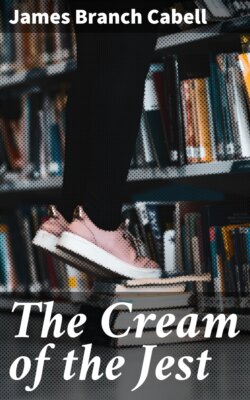Читать книгу The Cream of the Jest - James Branch Cabell - Страница 10
На сайте Литреса книга снята с продажи.
ОглавлениеI
Table of Contents
Of a Trifle Found in Twilight
Table of Contents
Thus he walked in twilight, regretful that he must return to his own country, and live another life, and bear another name than that of Horvendile.... It was droll that in his own country folk should call him Felix, since Felix meant “happy”; and assuredly he was not pre-eminently happy there.
At least he had ended the love-business of Ettarre and Guiron happily, however droll the necessitated makeshifts might have been.... He had very certainly introduced the god in the car, against Horatian admonition, had wound up affairs with a sort of transformation scene.... It was, perhaps, at once too hackneyed and too odd an ending to be æsthetically satisfactory, after all.... Why, beyond doubt it was. He shrugged his impatience.
“Yet—what a true ending it would be!” he reflected. He was still walking in twilight—for the time was approaching sunset—in the gardens of Alcluid. He must devise another ending for this high-hearted story of Guiron and Ettarre.
Felix Kennaston smiled a little over the thought of ending the romance with such topsy-turvy anti-climaxes as his woolgathering wits had blundered into; and, stooping, picked up a shining bit of metal that lay beside the pathway. He was conscious of a vague notion he had just dropped this bit of metal.
“It is droll how all great geniuses instinctively plagiarize,” he reflected. “I must have seen this a half-hour ago, when I was walking up and down planning my final chapters. And so, I wove it into the tale as a breast-ornament for Ettarre, without ever consciously seeing the thing at all. Then, presto! I awake and find it growing dark, with me lackadaisically roaming in twilight clasping this bauble, just as I imagined Horvendile walking out of the castle of Storisende carrying much such a bauble. Oh, yes, the processes of inspiration are as irrational as if all poets took after their mothers.”
This bit of metal, Kennaston afterward ascertained, was almost an exact half of a disk, not quite three inches in diameter, which somehow had been broken or cut in two. It was of burnished metal—lead, he thought—about a sixteenth of an inch in thickness; and its single notable feature was the tiny characters with which one surface was inscribed.
Later Felix Kennaston was destined to puzzle over his inability to recollect what motive prompted him to slip this glittering trifle into his pocket. A trifle was all that it seemed then. He always remembered quite clearly how it sparkled in the abating glare of that day’s portentous sunset; and how the tree-trunks westward showed like the black bars of a grate, as he walked slowly through the gardens of Alcluid. Alcluid, be it explained, was the queer name with which Felix Kennaston’s progenitors had seen fit to christen their fine country home near Lichfield.
